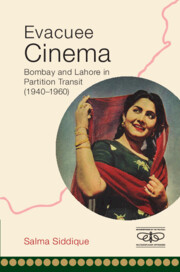Book contents
- Frontmatter
- Dedication
- Contents
- List of Figures
- Acknowledgements
- Introduction: A Moving Picture
- 1 The All-India Ambitions of Lahore
- Part 1 The Secular Stance of Bombay
- Part 2 Between Bombay and Pakistan
- Conclusion: Evacuee Cinema
- Appendix: Three Film Transcripts from the Fazli Family Collection
- Filmography
- Bibliography
- Index
2 - ‘Hindu Camera, Muslim Microphone’: A Periodical and Two Memoirs
Published online by Cambridge University Press: 11 October 2022
- Frontmatter
- Dedication
- Contents
- List of Figures
- Acknowledgements
- Introduction: A Moving Picture
- 1 The All-India Ambitions of Lahore
- Part 1 The Secular Stance of Bombay
- Part 2 Between Bombay and Pakistan
- Conclusion: Evacuee Cinema
- Appendix: Three Film Transcripts from the Fazli Family Collection
- Filmography
- Bibliography
- Index
Summary
A British Quaker and partition relief worker in India during the late 1940s, Richard Symonds would often find himself in the company of Congress leaders and other political dignitaries. Once he had the occasion to meet someone from a different profession at the house of R. K. Nehru during the end-months of 1947.
In their [Nehrus’] house I met a Bombay film director who said that all Muslims had been squeezed out of the industry. This was easily done, as they were dependent on Hindu capitalists.
Others too have referred to this ‘squeezing out’ – for example, short story writer Saadat Hasan Manto in his account of the Bombay Talkies where the studio owners received threatening letters against the retention of Muslim personnel. The expulsive aspect of partition palpable in film-making processes suggests that political polarisation also marked cultural production at this time. The vexing question of ‘how Muslims fared’ in the Bombay film enterprise is one that arises repeatedly and is normally settled by citing the ‘secular stance’ of the film industry, which was a heterogeneous space and where Muslims thrived as compared to other areas. The political fissures within the mainstream Mumbai film industry evident in the last six years, with many artistes and producers publicly issuing statements and making appearances that serve the Hindu nationalist ideology of the government, allow us to historically better understand the polarisation that accompanied partition. More than ever before, there is a need to examine the time when many above-the-line Muslim film personnel left Bombay (that is, between 1947 and 1957). This chapter analyses the emergence of this ‘secular stance’ and its relationship with film migration at the time of partition. In other words, how was a consensus around secularism built (if it was), given that the film industry did not have a sovereign government before partition and even afterwards, and when it was not a nationalised entity? Inferring from Priya Jaikumar's observation that ‘conflicts internal to nationalism were part of the Indian film industry's formative reality’, this chapter attempts to map out the Bombay film industry as a terrain of competing interests and conflicts.
- Type
- Chapter
- Information
- Evacuee CinemaBombay and Lahore in Partition Transit, 1940–1960, pp. 45 - 79Publisher: Cambridge University PressPrint publication year: 2023



